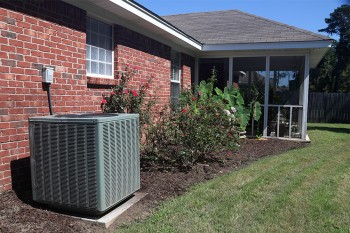National convention discusses ‘The next greatest thing’
By Renee C. Gannon
At the National Rural Electric Cooperative Association’s (NRECA) 74th annual meeting in New Orleans in February, more than 6,000 representatives of the nation’s electric cooperatives and allied organizations brainstormed what they consider “the next greatest thing” for electric cooperatives.
Artist Heather Klar brought ideas such as youth, diversity, technology, member engagement, community and competition to life with markers and canvas for attendees to ponder.
NC Electric Cooperatives receive safety awards
During the meeting, the following North Carolina cooperatives received the Certificate of Achievement for their safety records:
Albemarle EMC, Blue Ridge Electric, Brunswick EMC, Cape Hatteras Electric, Carteret-Craven Electric, Central EMC, Edgecombe-Martin County EMC, EnergyUnited, Four County EMC, Halifax EMC, Haywood EMC, Jones-Onslow EMC, Lumbee River EMC, Pee Dee Electric, Piedmont Electric, Pitt & Greene EMC, Randolph EMC, Roanoke Electric, Rutherford EMC, South River EMC, Surry-Yadkin EMC, Tideland EMC, Tri-County EMC, Union Power Cooperative and Wake EMC.
The next greatest thing engagement continued when representatives came together to set policy, discuss issues affecting their business, attend education forums on the changing energy industry landscape and conduct elections and awards at the three-day event. The Ernest N. Morial Convention Center hosted the annual meetings of national organizations that serve financial, insurance, branding, technology and other electric cooperative interests. Education forums focused on a variety on topics, including the changing landscape for cooperative power supply, tech trends, cyber security, co-op solar strategies, the upcoming national elections, the cooperatives’ vital role growing the rural economy and how electric cooperatives play the role of trusted energy advisor for members.
NRECA interim CEO Jeffrey Connor expressed optimism that investments in technology and in the next generation of co-op leaders will sustain cooperatives as the electric utility sector undergoes tremendous change.
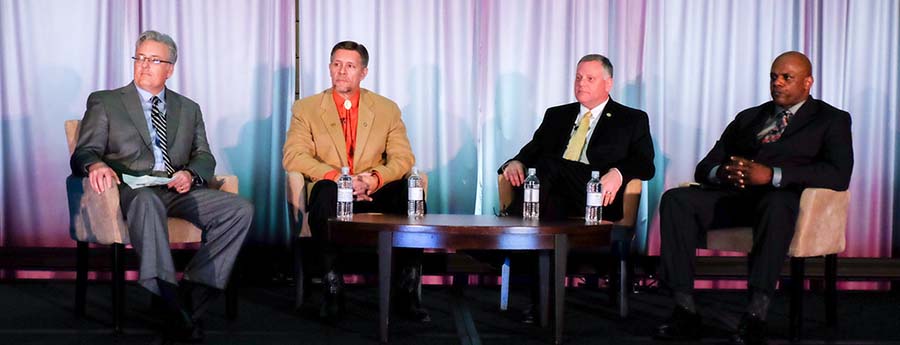 Randolph EMC CEO Dale Lambert (second from right) and Roanoke Electric COO Marshall Cherry (far right) discuss how to grow a cooperative's ACRE program.
Randolph EMC CEO Dale Lambert (second from right) and Roanoke Electric COO Marshall Cherry (far right) discuss how to grow a cooperative's ACRE program.
“Being a co-op means being a trusted energy advisor to meet changing consumer expectations with solutions like community solar and community storage; being a partner in exciting new technologies from the smart grid to the smart home. Being a co-op means being an innovative employer for the veterans returning home and millennials coming back to communities where they grew up,” said Connor.
“What hasn’t changed,” Connor continued, “is the way we meet our future head-on, with a firm understanding of who we are, what we can do, and how we can cooperate to do it together.”
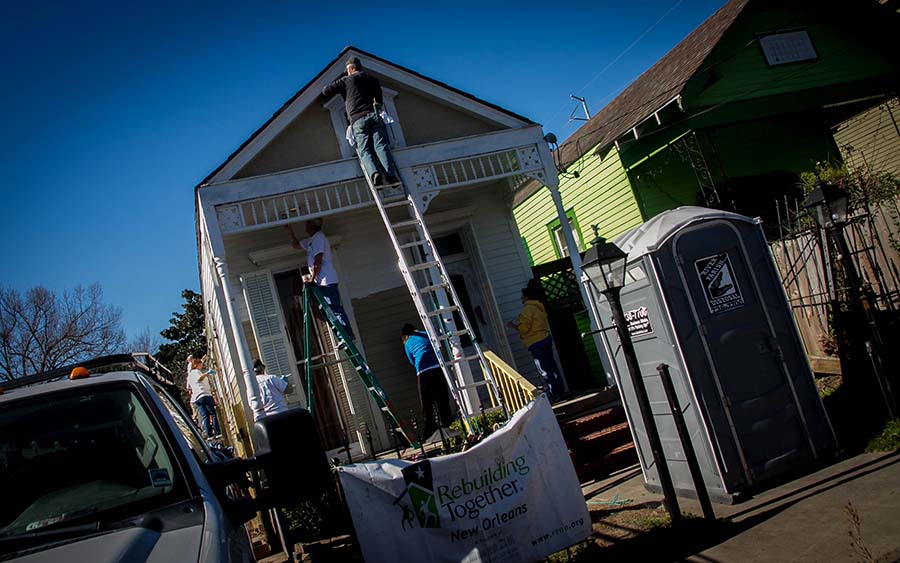
More than 100 cooperative representatives volunteered to repair homes in two New Orleans neighborhoods.
U.S. Agricultural Secretary Tom Vilsack told the audience that co-ops are the key to the economic vitality of rural America. He pointed out the USDA’s Rural Economic Loan and Grant program partnership with co-ops across the nation have brought 34,500 much-needed jobs since he became secretary, with $365 million invested in businesses and more than 1,300 businesses and community projects benefitting from this partnership. The energy efficiency and conservation effort within the partnership has led to 10 billion kilowatts saved so far. He cited the role of North Carolina’s electric cooperatives in utilizing both the loan and efficiency programs.
Just prior to the meeting, more than 100 volunteers from 40 of the nation’s electric cooperatives joined forces with Rebuilding Together New Orleans (RTNO) to make repairs to five homes in the city’s Gentilly and Carrollton neighborhoods. Volunteer teams built wheelchair ramps, painted, repaired fences and made energy-efficient upgrades to the homes as part of the annual Touchstone Energy community service project. Representatives from North Carolina’s Pee Dee Electric and EnergyUnited took part in the project.
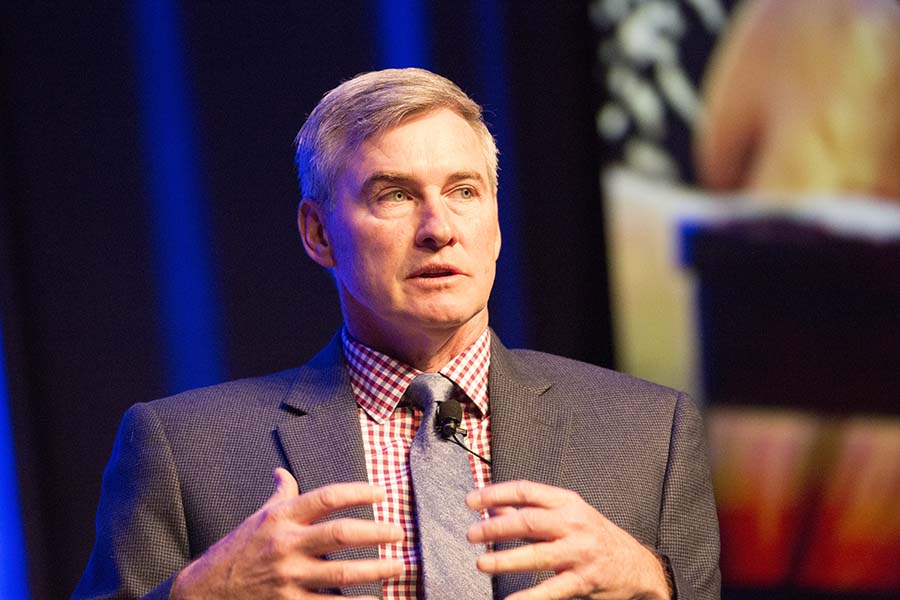 NCEMC CEO Joe Brannan served as a panelist in discussions on energy and tech trends as well as cooperatives being the trusted energy advisor for their members.
NCEMC CEO Joe Brannan served as a panelist in discussions on energy and tech trends as well as cooperatives being the trusted energy advisor for their members.
North Carolina participates in discussion
North Carolina’s electric cooperatives were recognized for the second-highest number of ACRE members in the nation. ACRE, or the Action Committee for Rural Electrification, is the federal Political Action Committee (PAC) facilitated by NRECA. It supports candidates in the U.S. House and Senate who will speak for and protect the interests of electric cooperatives and their member-owners.
“Our electric cooperative board members and employees are dedicated to ensuring cooperative members are represented by individuals locally and in Congress for all,” said Nelle Hotchkiss, senior vice president of corporate relations at the North Carolina Association of Electric Cooperatives. “With this strong foundation of support, we now look to extend the opportunity to our cooperative members and through education, we hope to engage them in the political process.”
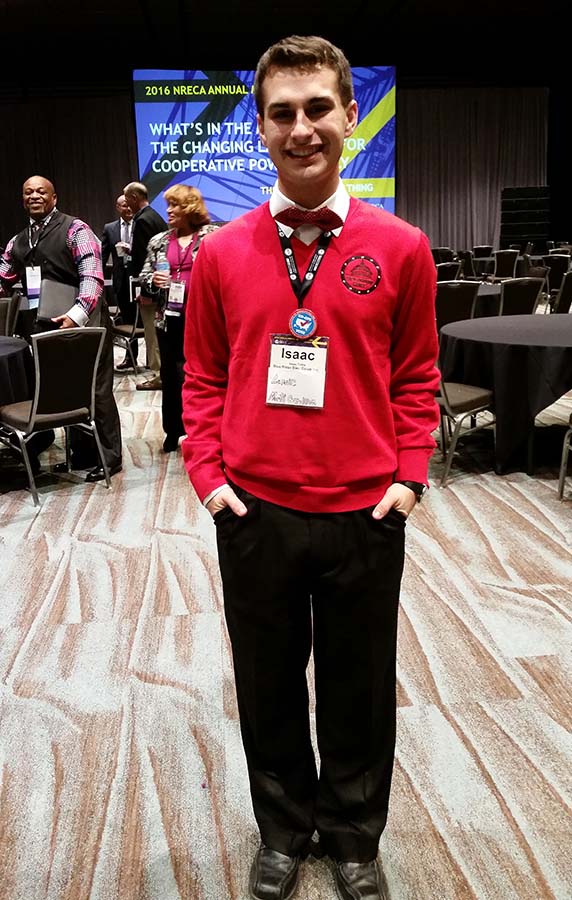 Blue Ridge Electric Youth Tourist Isaac Tuttle assisted during several education forums by gathering questions from the audience for the panelists to answer. “Being a Youth Tourist is a great experience, especially given the opportunity to represent my state at the NRECA annual meeting. The meeting allowed me to connect with new people and learn more about the cooperatives.”
Blue Ridge Electric Youth Tourist Isaac Tuttle assisted during several education forums by gathering questions from the audience for the panelists to answer. “Being a Youth Tourist is a great experience, especially given the opportunity to represent my state at the NRECA annual meeting. The meeting allowed me to connect with new people and learn more about the cooperatives.”
Marshall Cherry, COO of Roanoke Electric Cooperative, and Dale Lambert, CEO of Randolph EMC, served as panelists at the ACRE education forum on how to grow ACRE membership. Lambert also paneled a discussion on the changing landscape of power supply and how rural cooperatives stay ahead of these changes. Lambert commented that “flexibility and diversity are the keys to working within the changing landscape, and cooperatives must be the trusted energy advisor for their members and all things energy.”
N.C. representatives who also served on education forum panels included Joe Brannan, CEO of North Carolina Electric Membership Corporation (NCEMC) and Mike Burnette, senior vice president and COO of NCEMC. Both took part in sessions focused on energy and tech trends and the discussion on how and why cooperatives must be member-focused.
At the Consumer vs. Kilowatts: Being the Trusted Energy Advisor for Your Members forum, Brannan stated that cooperatives must reach out and communicate on all energy subjects, especially the difficult ones. “If you say ‘these are all the options. Let me share with you information that will help you make a decision,’ you increase and enrich the trust that you have with your members.”
About the Author
Renee C. Gannon is the senior associate editor of Carolina Country.



